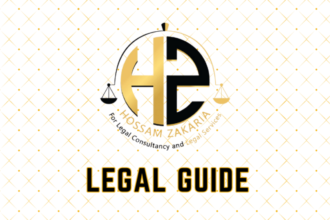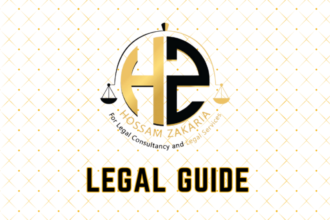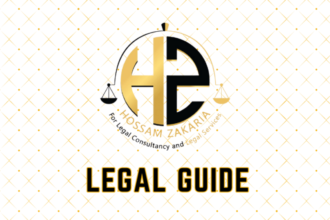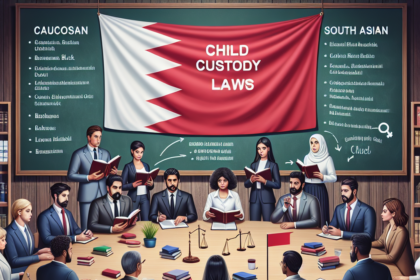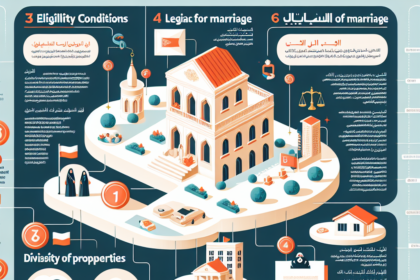Tag: Overview of Family Law in Bahrain
Introduction
Bahrain, a small island nation in the Persian Gulf, has a legal system that intricately blends Islamic law with modern legislative frameworks. Family law in Bahrain is primarily governed by Sharia principles, which are derived from the Quran and Hadith, as well as civil laws that aim to address contemporary societal needs. This comprehensive guide delves into the various aspects of family law in Bahrain, including marriage, divorce, child custody, and inheritance, providing a detailed understanding of the legal landscape. By familiarizing themselves with these legal principles, individuals can navigate family-related legal matters more effectively.
Chapter 1: Legal Framework of Family Law in Bahrain
1.1 Sources of Family Law
Islamic Law (Sharia)
- Foundation: Family law in Bahrain is predominantly based on Islamic Sharia law, which is rooted in the Quran and Hadith.
- Application: Sharia principles govern marriage, divorce, child custody, and inheritance matters for Muslims.
Civil Law
- Family Law Legislation: Bahrain’s family law also incorporates civil laws and statutes that complement and sometimes modify Sharia principles.
- Non-Muslim Laws: Specific provisions apply to non-Muslims, allowing them to follow their personal or religious laws in family matters.
1.2 Jurisdiction
Sharia Courts
- Role: Handle family law cases for Muslim residents.
- Structure: Includes first instance courts, courts of appeal, and courts of cassation.
Civil Courts
- Role: Handle family law cases for non-Muslim residents and expatriates.
- Application of Law: May apply the personal laws of the individuals involved, particularly for expatriates.
Chapter 2: Marriage Laws in Bahrain
2.1 Legal Requirements for Marriage
Muslim Marriages
- Eligibility: Both parties must be Muslim; a Muslim man can marry a non-Muslim woman (Christian or Jew), but a Muslim woman cannot marry a non-Muslim man without conversion.
- Consent: Both parties must consent to the marriage.
- Witnesses: At least two male Muslim witnesses or one male and two female Muslim witnesses are required.
- Mahr (Dower): A mandatory gift from the groom to the bride, agreed upon in the marriage contract.
Non-Muslim Marriages
- Civil Marriages: Non-Muslims can marry under the laws of their respective countries or opt for a civil marriage if applicable.
- Religious Ceremonies: Non-Muslim religious marriages are recognized if conducted by a registered religious institution.
2.2 Marriage Contracts
Contents
- Details: Includes personal details of the bride and groom, the amount of mahr, and any specific conditions agreed upon.
- Registration: Must be registered with the relevant local authority.
Modifications
- Mutual Agreement: Conditions in the marriage contract can be modified by mutual consent.
2.3 Polygamy
Legal Provisions
- Permissibility: Muslim men are allowed to marry up to four wives, provided they can treat them equally.
- Conditions: Must obtain consent from the existing wife or wives and ensure fair treatment and financial support for all.
Chapter 3: Divorce Laws in Bahrain
3.1 Legal Grounds for Divorce
Muslim Couples
- Talaq (Repudiation): The husband can unilaterally divorce the wife by pronouncing “talaq.”
- Khula (Mutual Consent): The wife can initiate divorce by returning the mahr or agreeing on compensation.
- Faskh (Judicial Divorce): Either spouse can seek divorce through the court on grounds such as cruelty, desertion, or failure to provide financial support.
Non-Muslim Couples
- Civil Grounds: Divorce can be sought based on mutual consent, irretrievable breakdown of the marriage, or other grounds recognized by their personal laws.
3.2 Divorce Procedures
Filing for Divorce
- Petition: The spouse seeking divorce files a petition with the Sharia or civil court.
- Mediation: Courts may require mediation to attempt reconciliation before proceeding with divorce.
Court Hearings
- Initial Hearing: Examination of the petition and initial evidence.
- Subsequent Hearings: Presentation of further evidence and witness testimonies if necessary.
Final Decree
- Issuance: The court issues a divorce decree if satisfied with the grounds for divorce.
- Registration: The divorce must be registered with the relevant local authority.
3.3 Financial Settlements
Alimony (Nafaqa)
- Entitlement: The wife may be entitled to alimony during the iddah (waiting period) and potentially beyond, depending on the circumstances.
Mahr (Dower)
- Unpaid Mahr: The husband must pay any outstanding mahr agreed upon in the marriage contract.
Property Division
- Customary Practices: Property division is typically based on mutual agreement or court determination, considering contributions and needs.
Chapter 4: Child Custody and Support
4.1 Custody Arrangements
Best Interests of the Child
- Primary Consideration: Courts prioritize the best interests of the child in custody decisions.
Custody Rights
- Mother’s Custody: Generally awarded custody of young children, especially daughters.
- Father’s Custody: Fathers are more likely to receive custody of older boys and continue to hold guardianship rights.
4.2 Visitation Rights
Non-Custodial Parent
- Entitlement: The non-custodial parent is entitled to reasonable visitation rights.
Supervised Visitation
- Conditions: May be ordered if there are concerns about the child’s safety or well-being.
4.3 Child Support
Financial Responsibility
- Non-Custodial Parent: Typically responsible for providing financial support for the child’s upbringing.
Calculation of Support
- Considerations: Based on the father’s income and the child’s needs, including education, healthcare, and general living expenses.
Enforcement
- Court Orders: Child support payments are enforceable by law, with penalties for non-compliance.
Chapter 5: Inheritance
5.1 Islamic Inheritance Laws
Principles
- Sharia Law: Governs inheritance for Muslims, ensuring specific shares for relatives based on Quranic principles.
Shares
- Fixed Shares: Prescribed shares for spouses, children, parents, and other relatives.
- Residue: Distributed among eligible heirs based on their relationship to the deceased.
5.2 Wills and Succession
Muslim Wills
- Limitations: A Muslim can only will up to one-third of their estate to non-heirs, with the remaining two-thirds distributed according to Sharia.
Non-Muslim Wills
- Freedom: Non-Muslims have more freedom in distributing their estate through a will, subject to local laws and any applicable personal laws.
5.3 Probate Process
Application
- Filing: Heirs must file a petition with the court to initiate the probate process.
- Documentation: Required documents include the death certificate, will (if any), and details of the estate.
Court Proceedings
- Verification: The court verifies the validity of the will and the legal heirs.
- Distribution: The estate is distributed according to the will (for non-Muslims) or Sharia (for Muslims).
Chapter 6: Adoption and Guardianship
6.1 Adoption Laws
Islamic Perspective
- Prohibition: Formal adoption as understood in the Western context is prohibited under Sharia; however, Kafala (sponsorship) is permitted.
Kafala (Sponsorship)
- Legal Guardianship: Allows for the care and upbringing of a child without conferring inheritance rights.
6.2 Guardianship
Parental Guardianship
- Fathers: Typically hold legal guardianship rights over their children.
- Mothers: Can be appointed as guardians in specific circumstances, especially if the father is deceased or incapacitated.
Court-Appointed Guardianship
- Criteria: Courts may appoint a guardian if the child’s welfare requires it, based on the best interests of the child.
Chapter 7: Legal Representation and Advice
7.1 Importance of Legal Counsel
Navigating Complexities
- Expertise: Understanding the intricacies of Bahraini family law and Sharia principles.
- Protection: Ensuring fair treatment and protecting legal rights.
7.2 Choosing a Lawyer
Qualifications
- Experience: Look for experience in family law and understanding of Sharia.
- Reputation: Seek recommendations and reviews from previous clients.
Communication
- Clarity: Choose a lawyer who communicates clearly and regularly.
7.3 Costs of Legal Services
Fee Structures
- Hourly Rates: Common for family law cases.
- Flat Fees: May be offered for specific services like drafting a will or filing for divorce.
- Retainer Agreements: Common for ongoing legal representation.
Chapter 8: Mediation and Alternative Dispute Resolution
8.1 Role of Mediation
Purpose
- Reconciliation: Attempt to resolve family disputes amicably.
- Efficiency: Provides a quicker and less adversarial resolution than court proceedings.
Process
- Mediator: A neutral third party facilitates discussions between the parties.
- Outcome: Can result in a mutual agreement, which may be formalized by the court.
8.2 Arbitration
Legal Framework
- Voluntary: Parties can agree to resolve their disputes through arbitration.
- Binding: The arbitration decision is binding and enforceable by law.
Process
- Arbitrator: A qualified arbitrator hears the case and makes a decision.
- Procedure: Less formal than court proceedings, but follows legal principles.
Chapter 9: Cultural Considerations in Family Law
9.1 Influence of Culture
Local Customs
- Integration: Family law in Bahrain is influenced by local customs and traditions.
- Respect: Understanding and respecting these customs is crucial in family law matters.
9.2 Expatriate Considerations
Personal Laws
- Application: Expatriates may choose to apply their personal laws in family matters.
- Embassy Support: Embassies can provide assistance and guidance on applying personal laws.
9.3 Social Context
Family Dynamics
- Roles and Responsibilities: Traditional roles and responsibilities within families impact family law decisions.
- Community Support: Strong community networks play a role in dispute resolution and support.
Chapter 10: Conclusion
Family law in Bahrain is a complex area that integrates Islamic principles, civil laws, and local customs. This comprehensive guide provides an in-depth understanding of key aspects such as marriage, divorce, child custody, inheritance, and more. By understanding these legal frameworks and cultural contexts, individuals can navigate family-related legal matters effectively and ensure compliance with Bahraini laws.
FAQs
- What are the primary sources of family law in Bahrain?
- The primary sources include Islamic Sharia, civil law codifications, and local regulations.
- How does Bahrain handle divorce for Muslim and non-Muslim couples?
- Divorce for Muslim couples is governed by Sharia principles, while non-Muslim couples can follow their personal laws or opt for civil divorce procedures.
- What are the key considerations for child custody in Bahrain?
- Courts prioritize the best interests of the child, typically awarding custody to mothers for young children and fathers for older boys.
- How is inheritance handled under Bahraini law?
- Inheritance for Muslims follows Sharia principles, with specific shares for relatives, while non-Muslims can distribute their estate through a will.
- What legal support is available for expatriates in family law matters?
- Expatriates can seek legal counsel familiar with their personal laws and may receive support from their embassies in applying these laws.
By understanding these aspects of family law in Bahrain, individuals and families can better navigate the legal landscape and ensure they operate within the bounds of the law.
